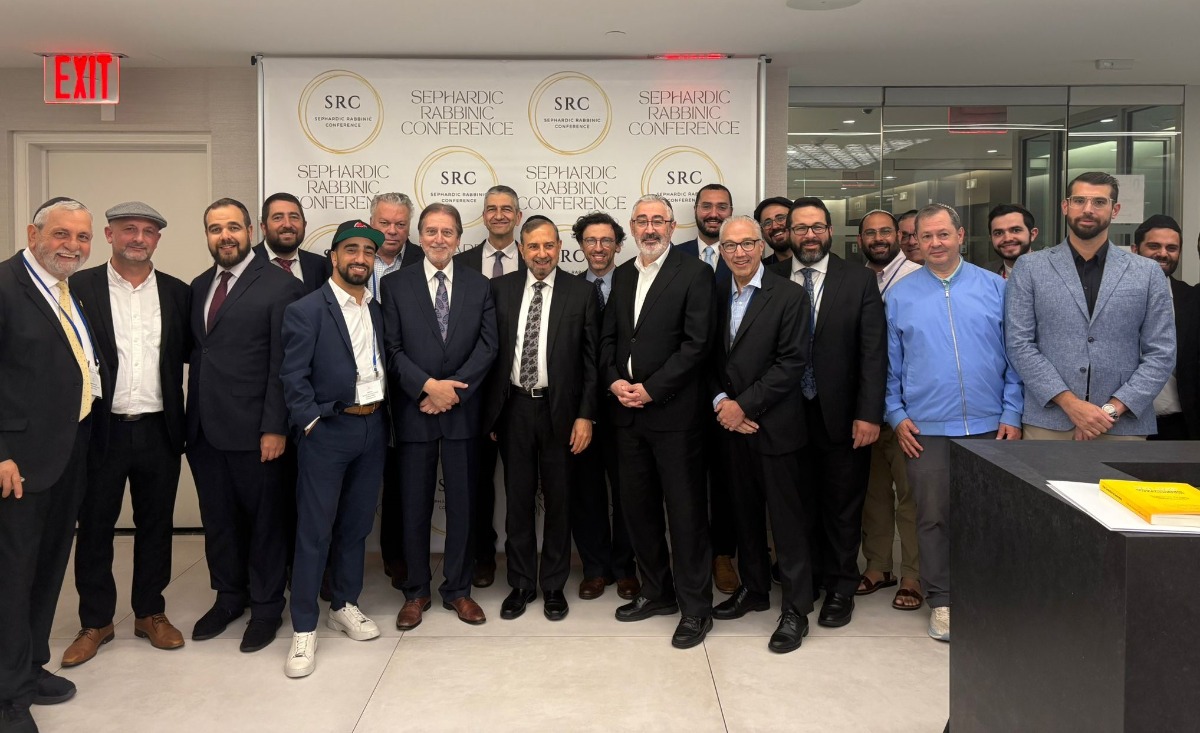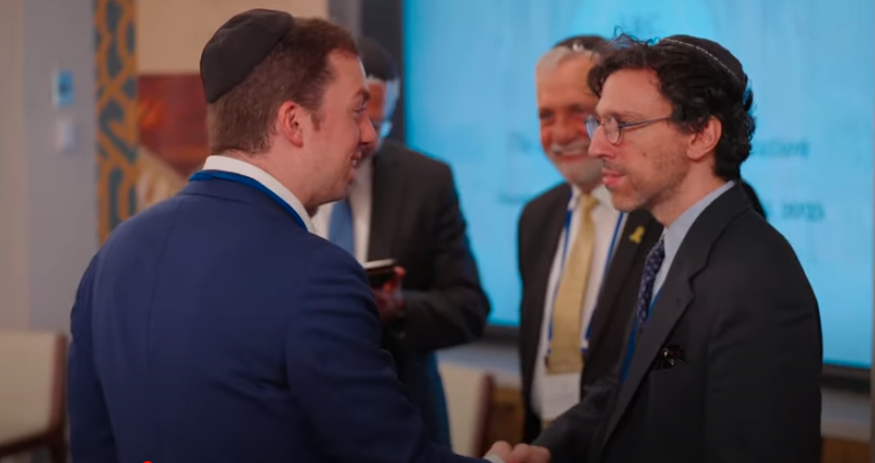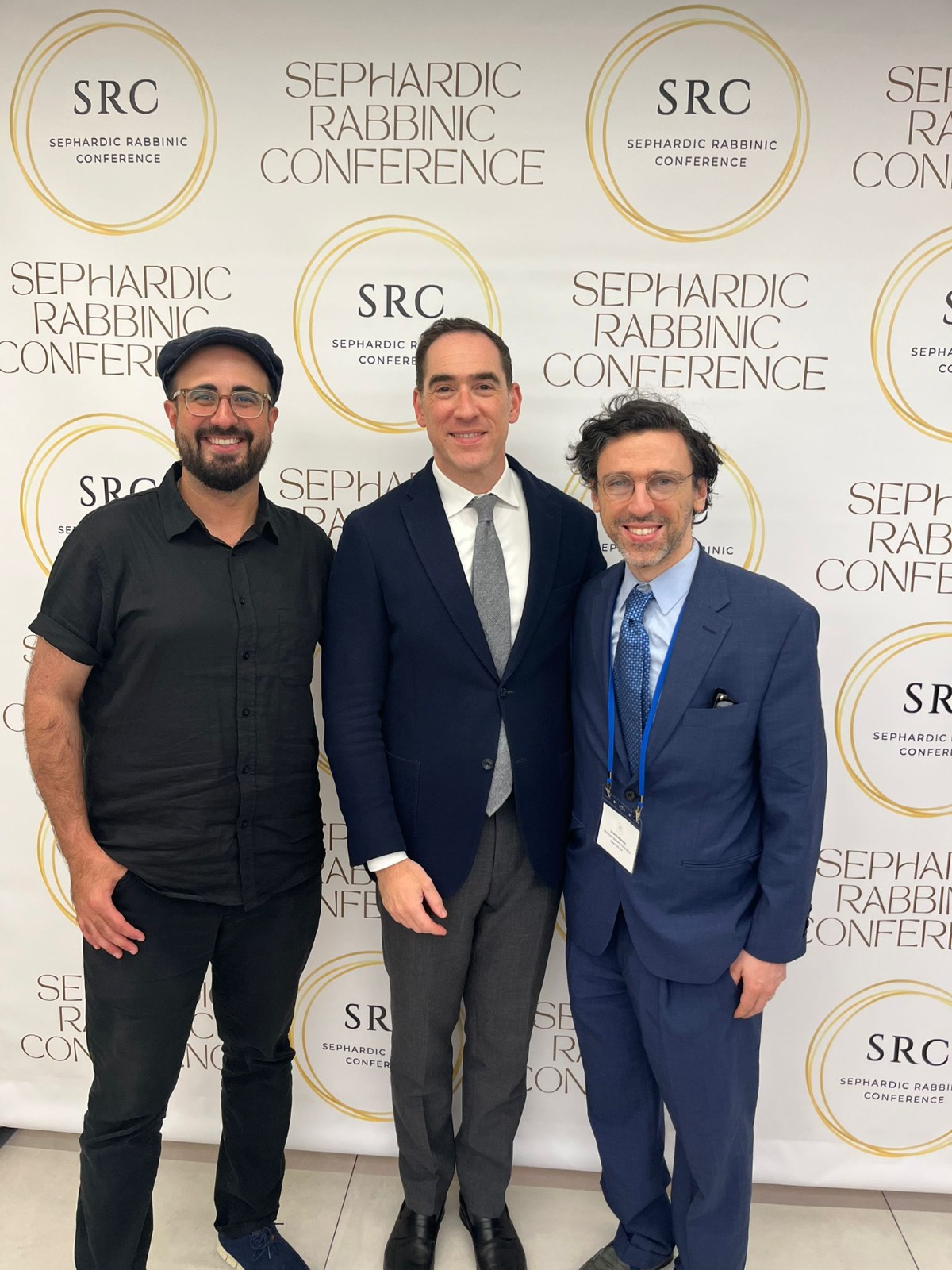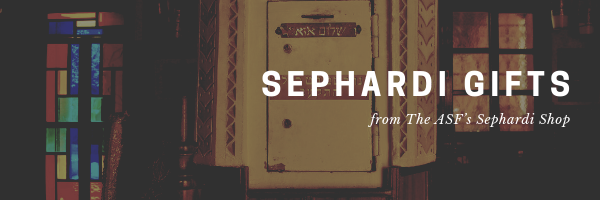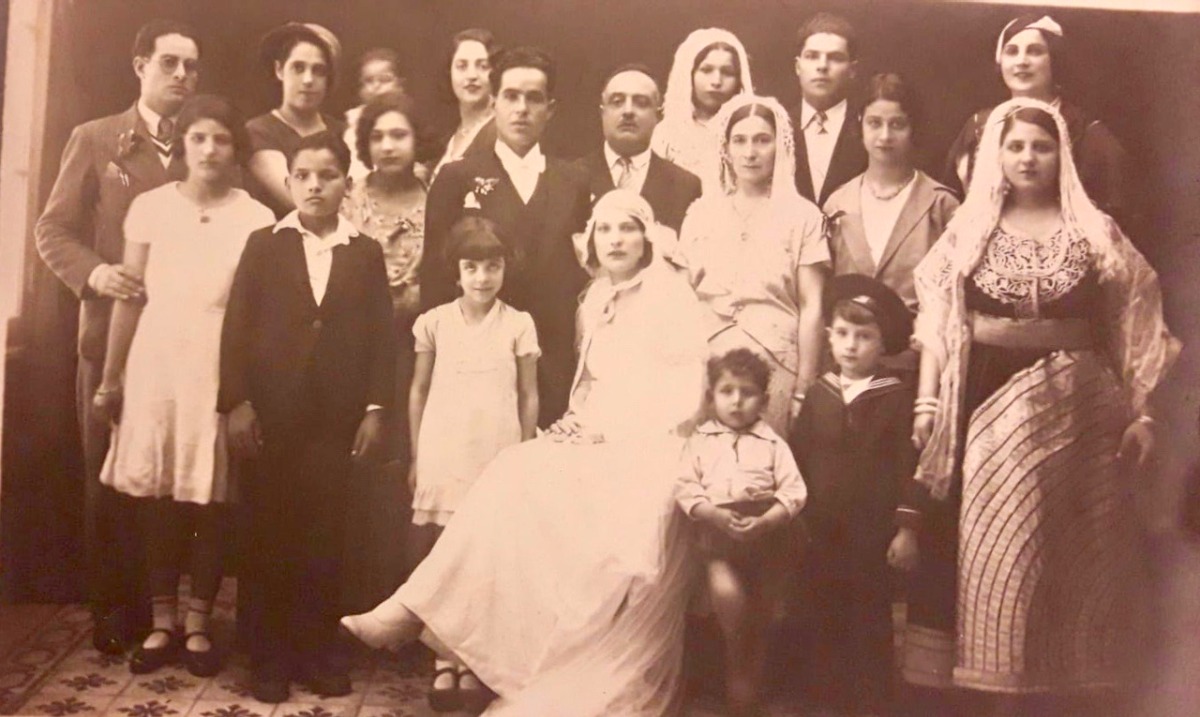In Memory of Rabbi Moshe Hauer, A”H, the Orthodox Union’s Executive Vice President, who gave a spirited address to the SRC emphasizing the OU’s Sephardi roots, praising the Syrian Sephardi community, and advancing Jewish unity. May his memory be for a blessing always.
Click here to dedicate a future issue in honor or memory of a loved one
Subscribe ◊ Upcoming Events ◊ ASF Sephardi Shop ◊ Donate ◊ Sephardi Ideas Monthly ◊ ASF IJE ◊ ASF Sephardi House ◊ Archive
The Sephardi World Weekly is made possible by Daniel Yifrach, Rachel Sally, Professor Rifka Cook, Maria Gabriela Borrego Medina, Rachel Amar, Deborah Arellano, & ASF VP Gwen Zuares!
“Sephardic rabbis unite at a perhaps historic conference to reclaim a classical tradition”
By Avi Garson, The Jewish Chronicle
Photo of the Hakhamim and other Conference Participants, Orthodox Union Headquarters,10 August 2025
(Photo courtesy of the SRC)
The inaugural Sephardic Rabbinic Conference took place in the beginning of August, 2025. The ASF was proud to be a Conference co-sponsor (along with The Habura, Orthodox Union, and Sephardic Brotherhood). The Conference’s founder and co-organizer, Avi Garson, recently penned a recap of the pioneering event.
Co-founder of The Habura, a learning community dedicated to Classical Sephardic Judaism, and Director of the Menachem Begin Scholars Program at the Tikvah Fund, Garson noted that the Conference was, “not a romantic call to return to the courts of al-Andalus or the study halls of Aleppo.” Instead, with an eye to contemporary challenges, Garson pointed to a relevant Sephardi middle path:
We live in a time of extremes. On one side: apathy, assimilation, and moral confusion. On the other: black-and-white thinking and imposed dogma. But our tradition has long offered a third way: fidelity to tradition without fundamentalism, intellectual openness without dilution, and national commitment that rejects sectarianism.
At the Conference, this third way brought together participants through a “shared spirit…grounded in tradition, intellectually open (and) proudly Zionist.” Rabbinic figures, social entrepreneurs, writers and educators from around the world “revisited some of the classical modes of Sephardic pedagogy rooted in language, structure, and soul.”
Garson concluded by emphasizing that the conference was only a first step, setting in place a foundation for future endeavors, “In the months ahead, we hope to form working groups that will be focused on curriculum development, yeshivah planning, campus engagement, and more. Further gatherings are already being discussed.”
~~~~~~~
FEATURE: The Inaugural Sephardic Rabbinic Conference: The Future of Sephardic Education
Conference attendees from Argentina, Mexico, and the US
(Screenshot courtesy of the SRC)
The inaugural Sephardic Rabbinic Conference was held August 10–11, 2025, at the Orthodox Union Headquarters in Lower Manhattan. With the conference’s pedagogical focus captured in its title, “The Future of Sephardic Education,” the event drew over fifty leading rabbis and community leaders representing Syrian, Persian, Greek, Turkish, Moroccan, Iraqi, and Spanish & Portuguese traditions from across the globe, all devoted to advancing Sephardic educational ideals and communal vitality.
The American Sephardi Federation proudly co-sponsored the Conference, with Executive Director Jason Guberman, Director of Publications Dr. Aryeh Tepper, and National Director of Sephardi House & Education Ruben Shimonov all offering remarks. It was beautiful to witness collaboration among diverse Jewish organizations and community voices who came together to promote the classic Sephardic tradition of intellectual openness, Jewish unity, and the pursuit of human excellence. Conference organizers were clear that the conference was only the beginning, a first step in a renewed commitment to advancing the Classic Sephardic vision for all of the Jewish people, and the world.
~~~~~~~
“A New Dawn for Sephardic Education”
By Erin Levi, The Bukharian Times
Ruben Shimonov (the ASF’s National Director of Sephardi House & Education), Hakham Joseph Dweck (Senior Rabbi of the Spanish and Portuguese Sephardi Community of the United Kingdom), and Jason Guberman (ASF’s Executive Director), Sephardic Rabbinic Conference, Orthodox Union Headquarters,10 August 2025
(Photo courtesy of Ruben Shimonov)
The inaugural Sephardic Rabbinic Conference united participants from across the world, under the theme, “The Future of Sephardic Education.”
In recognition of the growing numbers and increasing importance of Bukharian Jews in America, a conference session dedicated to campus life for American Jews featured two Bukharian educators: Ruben Shimonov, the ASF’s National Director of Sephardi House & Education, and Zack Zav, Regional Director of the Sephardic American Mizrahi Initiative (SAMi), Philadelphia.
Shimonov presented to Conference participants “case studies and methodologies from our Fellowship” and “spoke about the power of enriching Jewish campus life for all students through the integration of Sephardic and Mizrahi heritage and wisdom.”
For his part, Zav celebrated the Conference as an “inspiring opportunity to join rabbis and leaders from across the country in discussing the future of Sephardic life in America [and] building stronger bridges between campus life and local Sephardic communities.”
Reflecting on his participation in the Conference, Rabbi Joseph Dweck, Senior Rabbi of the Spanish and Portuguese Sephardi Community of the United Kingdom (who will soon make Aliyah to Israel), articulated a feeling shared by the conference attendees, “‘It was exhilarating to join so many colleagues and friends for a common purpose — to strengthen and focus on our illustrious heritage and its principles of education.’”
~~~~~~~
By Dr. Hélène Jawhara Piñer, a 2018 ASF Broome & Allen Fellow
In this extraordinary, award-winning and best-selling cookbook now in its 4th imprint, chef and scholar Hélène Jawhara-Piñer combines rich culinary history and Jewish heritage to serve up over fifty culturally significant recipes. Steeped in the history of the Sephardic Jews (Jews of Spain) and their diaspora, these recipes are expertly collected from such diverse sources as medieval cookbooks, Inquisition trials, medical treatises, poems, and literature. Original sources ranging from the thirteenth century onwards and written in Arabic, Spanish, Portuguese, Occitan, Italian, and Hebrew, are here presented in English translation, bearing witness to the culinary diversity of the Sephardim, who brought their cuisine with them and kept it alive wherever they went. Jawhara-Piñer provides enlightening commentary for each recipe, revealing underlying societal issues from anti-Semitism to social order. In addition, the author provides several of her own recipes inspired by her research and academic studies.
Each creation and bite of the dishes herein are guaranteed to transport the reader to the most deeply moving and intriguing aspects of Jewish history. Jawhara-Piñer reminds us that eating is a way to commemorate the past.
Jews, Food, and Spain: The Oldest Medieval Spanish Cookbook and the Sephardic Culinary Heritage
by Dr. Hélène Jawhara Piñer
2023 Gourmand World Cookbook Awards Best Jewish Food Culture Book; 2022 National Jewish Book Award Finalist
A fascinating study that will appeal to both culinarians and readers interested in the intersecting histories of food, Sephardic Jewish culture, and the Mediterranean world of Iberia and northern Africa.
In the absence of any Jewish cookbook from the pre-1492 era, it requires arduous research and a creative but disciplined imagination to reconstruct Sephardic tastes from the past and their survival and transmission in communities around the Mediterranean in the early modern period, followed by the even more extensive diaspora in the New World. In this intricate and absorbing study, Hélène Jawhara Piñer presents readers with the dishes, ingredients, techniques, and aesthetic principles that make up a sophisticated and attractive cuisine, one that has had a mostly unremarked influence on modern Spanish and Portuguese recipes.
Matzah and Flour: Recipes from the History of the Sephardic Jews
by Dr. Hélène Jawhara Piñer
A collection of 125 meticulously crafted recipes showcasing the enduring flavors that define Sephardic culinary heritage.
Matzah and Flour: Recipes from the History of the Sephardic Jews offers a tantalizing exploration of the central role of matzah and flour in Sephardic cuisine. Journey through centuries of tradition as flour, from various grains like chickpea, corn, and barley, intertwines with cultural narratives and religious observance. Delve into the symbolism of matzah, from its origins in the Exodus story to its embodiment of resilience and identity. Each of this cookbook’s thoughtfully prepared recipes is a testament to the transformative power of flour in Sephardic culinary heritage. From savory delicacies to sweet delights, these timeless flavors have sustained Sephardic families through history. Matzah and Flour is a celebration of tradition, history, and the enduring legacy of Sephardic Jewish cuisine.
~~~~~~~
Upcoming Events or Opportunities
Our friends at the Museum of the Bible in partnership with the American Sephardi Federation and the Wonder Project present:
“House of David” Season Two Screening
Join Wonder Project, the ASF, and the Museum for the first two episodes of “House of David” Season Two in the World Stage Theater. Watch the drama unfold as David goes from shepherd to warrior. David rises as the Age of Iron reshapes Israel. With Saul’s reign crumbling, faith and power clash for the nation’s future.
Guests can also see evidence of the real House of David. The Tel Dan Stele, which contains the phrase the “House of David,” is the earliest extrabiblical evidence for David’s rule. Found in excavations in 1993 and ’94, the Tel Dan Stele is on display for a limited time. There will be tours of the exhibit before and after the screenings.
Tuesday, 21 October, at 7:00 PM ET
@Museum of the Bible (World Stage Theater)
Sign-up Now!
Tickets: Complimentary; RSVP Required
~~~~~~~
Our friends at the Center for Jewish History in partnership with the American Sephardi Federation present:
Family History Today: A Moroccan Jewish Genealogical Journey
“Join us for a fascinating talk with Raquel Levy-Toledano as she shares her remarkable journey to uncover the origins of her great-grandfather, born in Manchester. What began as a family mystery evolved into an international quest spanning Morocco, England, Portugal, the Azores, and Cape Verde, combining traditional archival research with genetic testing to reveal an unknown branch of her family—the Levy Belfsahi.
Along the way, Raquel connected with distant relatives around the world and shed light on the urgent need for more organized research on Moroccan Jewish genealogy. To help bridge this gap, she founded the Jewish Moroccan Genealogy group on Facebook, which now links over 400,000 profiles of Moroccan and Algerian Jews, reconnecting families and reconstructing a shared history.”
Monday, 3 November, at 5:00 PM ET
Sign-up Now!
Live on Zoom
Tickets: Pay what you wish - Free
About the speaker:
“Raquel Levy-Toledano was born in Morocco, then moved to France where she received her MD in gynecology and PhD in molecular endocrinology, followed by postdoctoral training at the NIH in Maryland. She is a board member of IAJGS, a board member of the Cercle de Généalogie Juive where she manages the Genetic Genealogy Group, a member of the General Assembly of the International Institute for Jewish Genealogy in Israel, president of NAJMA (Nos Ancêstres Juifs Marocains et Algériens) Genealogical Society, an expert curator of Geni’s Moroccan and Algerian Jewish family tree, co-administrator of the Avotaynu DNA project section involving North African Jews and founder of the Généalogie des Juifs Marocains Facebook Group, which has 13,000 members. She has published several articles in Généalo-J and other journals and has presented at numerous conferences and Zoom meetings.”

